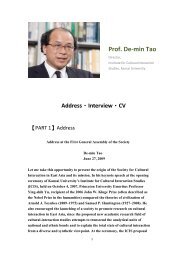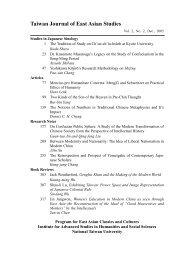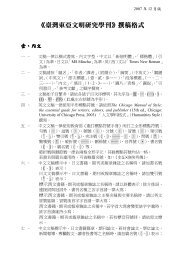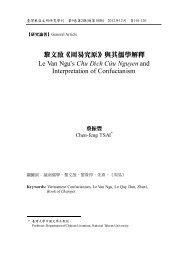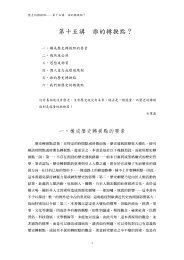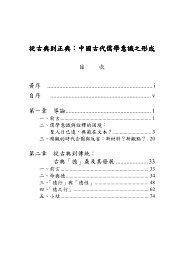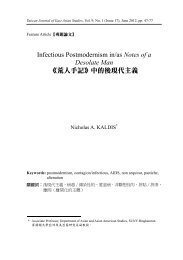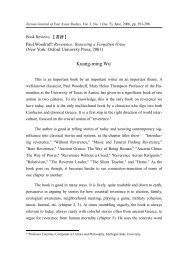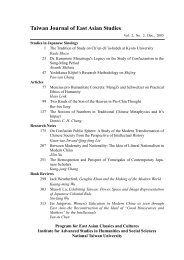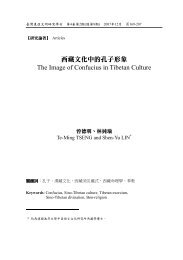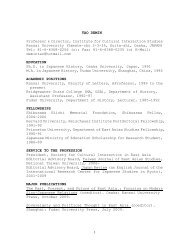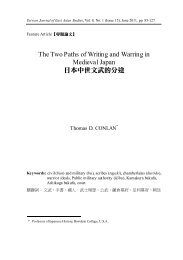臺灣東亞文明研究學刊 - 東亞經典與文化研究計畫 - 國立臺灣大學
臺灣東亞文明研究學刊 - 東亞經典與文化研究計畫 - 國立臺灣大學
臺灣東亞文明研究學刊 - 東亞經典與文化研究計畫 - 國立臺灣大學
Create successful ePaper yourself
Turn your PDF publications into a flip-book with our unique Google optimized e-Paper software.
Jörn RÜSEN Future-directed Elements of an European Historical Culture 211<br />
terms is approximately the same. Yet 'historical culture' is a more open and<br />
comprehensive concept than 'collective memory'. 2 The memory-discourse has not<br />
yet sufficiently tackled the future dimension of human time orientation. At least in<br />
the German-speaking world the term 'historical culture' includes this perspective. It<br />
is not characterized by a structural gap between historical studies and collective<br />
memory as it has been the case in the memory discourse from its beginning with<br />
Maurice Halbwachs and its further development by Pierre Nora till today. So I will<br />
use the term 'historical culture' and by this I mean the procedures and institutions to<br />
interpret the past in order to understand the present and to develop a future<br />
perspective of human life. These procedures and institutions include memory<br />
politics in its various fields and dimensions like history teaching in school, the<br />
erection of monuments and memorials, historical museums, public debates about<br />
the past. 3 It includes the works of art representing the past, and it includes, of<br />
course, the cognitive efforts of academic disciplines.<br />
In my following argumentation I will not refer to specific fields of historical<br />
culture in Europe, but I would like to prefer a more general and rather abstract<br />
theoretical argumentation, which concentrates on basic criteria of historical sense<br />
generation. It is exactly on this fundamental level of making sense of the past by<br />
historical thinking where Europe is developing ideas and discursive strategies<br />
which I think are of interest not only for the Europeans.<br />
2 The applicability of this concept has been stressed by Klas-Göran Karlsson in "The Holocaust as a<br />
Problem of Historical Culture: Theoretical and Analytical Challenges," in Klas-Göran Karlsson<br />
and Ulf Zander (eds.) Echoes of the Holocaust: Historical Cultures in Contemporary Europe<br />
(Lund: Nordic Academic Press, 2003), pp. 9-58; cf. "Interpreting the Holocaust: Some Theoretical<br />
Issues," in Klas-Göran Karlsson and Ulf Zander (eds.) Holocaust Heritage: Inquiries into<br />
European Historical Cultures. (Malmö : Sekel, 2004), pp. 35-62.<br />
3 The most famous German example for such a public controversy is the co-called Historian's<br />
Debate in the 80s about the role the reference to the Nazi-period should play in the<br />
conceptualization of German identity especially in respect to its national dimension.<br />
iii



